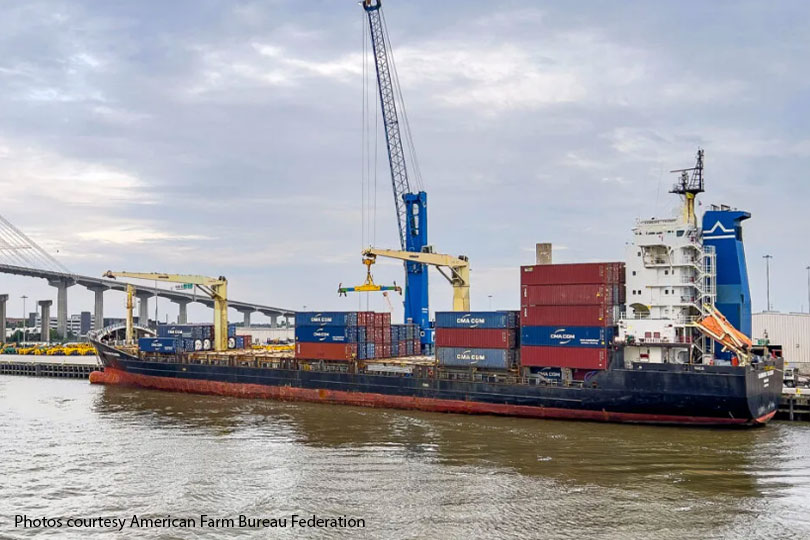By Jessica Domel
Multimedia Reporter
Citing national security concerns, U.S. President Donald Trump announced over the weekend his plan to implement new tariffs on goods from Canada, Mexico and China until the countries take action to stem the flow of undocumented people and illegal drugs, including fentanyl, into the United States.
“The sustained influx of illegal aliens and illicit opioids and other drugs has profound consequences on our nation, endangering lives and putting a severe strain on our healthcare system, public services, communities and schools,” Trump said.
The president said those challenges threaten the fabric of America’s society.
“Gang members, smugglers, human traffickers and illicit drugs of all kinds have poured across our borders and into our communities,” Trump said. “Mexico has played a central role in these challenges, including by failing to devote sufficient attention and resources to meaningfully stem the tide of unlawful migration and illicit drugs.”
According to the White House, the president is implementing an additional 25% tariff on imports from Canada and Mexico and an additional 10% tariffs on imports from China.
Energy resources from Canada will see a 10% tariff.
“President Trump is taking bold action to hold Mexico, Canada and China accountable to their promises of halting illegal immigration and stopping poisonous fentanyl and other drugs from flowing into our country,” a White House fact sheet states.
The White House reports Chinese officials have failed to take the actions necessary to stem the flow of precursor chemicals to known criminal cartels and shut down money laundering by transnational criminal organizations.
As for Canada, the White House said, “There is also a growing presence of Mexican cartels operating fentanyl and nitazene synthesis labs in Canada. A recent study recognized Canada’s heightened domestic production of fentanyl, and its growing footprint within international narcotics distribution.”
After Trump made the announcement Saturday, officials from Mexico and Canada threatened retaliatory tariffs while officials from China said they’d take the dispute to the World Trade Organization.
Canadian Prime Minister Justin Trudeau said the country will levy 25% tariffs on $155 billion in U.S. goods, including agricultural products, beer, wine, lumber and appliances, in two tranches.
The first tranche of tariffs on $30 billion in goods were originally set to go into effect Tuesday, Feb. 4; however, officials announced Monday, Feb. 3 both countries came to an agreement to put off the tariffs for another 30 days.
Canadian officials say the tariffs, if implemented, will impact poultry, pork, dairy, wheat, steel and aluminum products, and other goods.
The tariffs would remain in effect until the U.S. lifts its tariffs, Trudeau said.
Mexican President Claudia Sheinbaum posted on X over the weekend that they too plan to implement retaliatory tariffs, but on Monday, Sheinbaum said Mexico reached an agreement with Trump to put the tariffs, on both sides, on hold for a month.
According to the U.S. Department of Agriculture, China, Mexico and Canada are the top three markets for U.S. agricultural goods.
Following the tariff threats, agricultural groups weighed in on how they could impact farmers, ranchers and dairymen.
Texas Farm Bureau (TFB) President Russell Boening said Texas farmers and ranchers anticipated tariffs would be used by the Trump administration as an economic tool.
“There are concerns tariffs may increase the cost of some agricultural inputs in the U.S.,” Boening said. “Higher costs of production are very difficult to absorb. Profit margins in many sectors of agriculture are currently extremely thin or non-existent, and higher costs of production cannot be passed on to the consumer.”
Zippy Duvall, president of the American Farm Bureau Federation, said Farm Bureau members support the goals of security and ensuring fair trade with our North American neighbors and China.
“Unfortunately, we know from experience that farmers and rural communities will bear the brunt of retaliation. Harmful effects of retaliation to farmers ripple through the rest of the rural economy,” Duvall said.
More than 80% of the U.S. supply of a key fertilizer ingredient, potash, comes from Canada. Duvall said tariffs that increase fertilizer prices threaten to deliver another blow to the finances of farm families who are already dealing with inflation and high supply costs.
“Farm and ranch families answer the call to feed America’s families and the world, and these tariffs and the promised retaliation will put further stress on their livelihoods,” Duvall said. “More than 20% of U.S. farm income comes from exports, which are dominated by these three markets.”
Last year, the U.S. exported more than $30 billion in agricultural products to Mexico, $29 billion to Canada and $26 billion to China.
“The uncertainty hits just as operating loans are being secured and spring planting approaches, leaving farmers in a tough spot. We look forward to working with President Trump to position our farmers for success while also ensuring American strength and leadership on the international stage,” Duvall said.
Boening said the Trump administration supports U.S. agriculture, and the grassroots farm organization trusts the administration “will protect the interests of farm and ranch families as it makes economic decisions.”
Note: This story was updated Tuesday, Feb. 4 to reflect an agreement between both the U.S. and Canada had been reached to put off tariffs for another month.


Leave A Comment